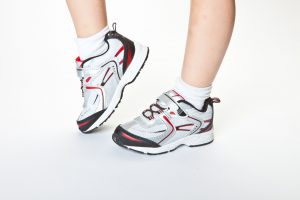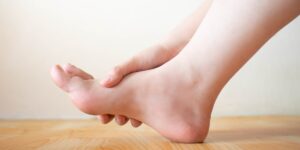Medically Reviewed by Dr. Rachel N. Verville
March 23, 2017
 Dr. Verville meets many different parents in Frisco, and a common concern echoed by most moms and dads is wondering whether they should be worried about their child’s flat feet (also known as flatfoot). Don’t panic if your son or daughter has flat feet—almost all babies are born without that visible arch. Babies have a fat pad on the inner border of their feet that hides the arch and disappears over time.
Dr. Verville meets many different parents in Frisco, and a common concern echoed by most moms and dads is wondering whether they should be worried about their child’s flat feet (also known as flatfoot). Don’t panic if your son or daughter has flat feet—almost all babies are born without that visible arch. Babies have a fat pad on the inner border of their feet that hides the arch and disappears over time.
Flat feet usually fade away by the time a child is six years old, but about two out of every ten kids will continue to have flat feet into adulthood. There are two different types of flat feet your child could develop, so be sure to consult with Frisco foot doctor Dr. Verville to receive a proper diagnosis and treatment plan.
2 Types of Flat Feet
- Flexible flatfoot: This is above and beyond the most common type of flatfoot in Frisco children. Kids have flexible bones and joints, and if your son or daughter has flexible flat feet, they shouldn’t be experiencing any pain or discomfort. If you’re not sure, have your child stand on his or her tiptoes and look at their feet—does an arch become visible? If so, they likely have flexible flatfoot, which usually requires no treatment from a foot doctor.
- Rigid flatfoot: Rigid flatfoot is the least common type of flatfoot, but also the most serious. It can often be the result of problems with the bones in the feet and can cause pain and disability. It’s rarely seen in young children and will usually become apparent during the teen years.
Treating Flat Feet in Frisco
If your child has flat feet, don’t diagnose and treat them on your own. Visit a foot doctor like Dr. Verville who can evaluate his or her condition properly and make professional recommendations for treatment.
If Dr. Verville determines that your child has flexible flatfoot, and your child isn’t in any pain, it’s likely that no treatment will be necessary. However, some children with flexible flatfoot may experience some aching in feet or legs after activity; this can usually be easily treated with cushioned arch support.
For kids with a short Achilles tendon, stretching should help, as previously mentioned above. Try to avoid hard arch supports, which can hurt more than they help.
In rare cases, rigid flatfoot or short Achilles tendons will require surgery. Surgery is usually only discussed when your child is older and more conservative treatment efforts have failed.
What to Do If Your Child Has Flat Feet
Worried about your child’s flat feet? It’s important to bring your son or daughter to a gentle doctor with extensive podiatry experience. Schedule an appointment with Frisco area foot doctor, Dr. Verville, by calling RNV Podiatry at (214) 385-8822.







